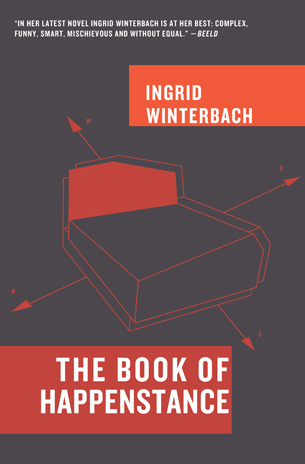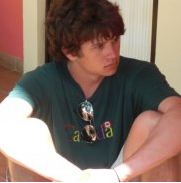The building goes up in flames, causing the protesters to scatter, and turning the attempt at damnation, at justice, into a bloodbath consuming not just those involved, but several innocent bystanders, as well. The scene eerily echoes recent, similar real-life protests in places like Ferguson, Missouri, and though Winterbach does ultimately bring righteousness down upon the villains of The Elusive Moth, she does so at the expense of the justice-seekers, as well, calling into question the true value of their efforts. — Benjamin Woodard
The Elusive Moth
Ingrid Winterbach
Translated from the Afrikaans by Iris Gouws and Ingrid Winterbach
Open Letter
198 pages ($14.95)
ISBN: 978-1-934824-77-1
Often, we travel for the same reasons we read stories: escape, insight, knowledge, adventure. Stepping off of an airplane in a new environment offers the same opportunity for internal charge (or recharge) as the mental submersion provided by a great narrative. In both cases, home is far away—if only sometimes in the reader’s mind—and endless opportunities await engagement. So it’s no surprise that Ingrid Winterbach’s The Elusive Moth, originally published in 1994 but now translated for English-speaking audiences, succeeds as both a novel and literary expedition, for as Winterbach ushers her protagonist, lepidopterist Karolina Ferreira, from her urban home to the small community of Voorspoed in the Free State—a town full of singing lawyers, seductive economists, and corrupt officials—so too does the reader feel the pull of investigation. This land functions as setting and as a character, with its intense heat and unpaved roads, providing an ideal stomping grounds for Karolina and her associates. And while the novel lingers in a period two decades removed from our own, never does it read as a dated volume of yesteryear. Rather, Winterbach’s clever, fascinating meditation on gender and power echoes societal flaws still present around the world, making the volume vital and timely.
As The Elusive Moth opens, Karolina spends her days in the veldt outside Voorspoed with Basil, a part-time resident of the town who she picked up during her travels. Here, she studies moths, specifically the “distribution and breeding patterns of the moth species Hebdomophruda crenilinea,” while Basil, himself a pupil under a local herbalist, scours the land for unusual vegetation and natural remedies. In the evenings, back with society, the duo loiters at the nearby hotel bar, playing games of snooker, drinking whiskey, and observing the locals. As in the scrub fields, their critical eyes work overtime in town to separate the wheat from the chaff, finding focus on those that make the community’s ecosystem function. They make fun of some, like the sullen magistrate, or the lawyer Pol, and question the political tactics of others, particularly Lieutenant Kieliemann, who sexually harasses Karolina nightly, pressing against her until she forces him off, and his boss, Captain Gert Els. There are also the many fleeting groups that interact with Karolina and Basil: a theatre troupe secretly organizing the residents to rise against the town’s authorities, a man trying to escape his captors, and a pair of travelers who befriend Karolina while passing through the area. As these characters and engagements slowly stack up, Karolina devotes far more time to the community of Voorspoed than its desolate outskirts, dancing on Saturday evenings, striking up a romance with a man named Jess, looking for a pair of mysterious lovers in the cemetery, and investigating the men who run the small town with inordinate amounts of power. Her research shifts from moths to men.
And yet, much like the long, lazy days that it paints on every page, The Elusive Moth refuses to latch onto Karolina’s suspicions in the same way a lesser novel would. Instead of using her wariness to sprint forward in a series of action set pieces, Winterbach lets her characters meander. While Karolina supposes Gert Els of nefarious doings, she never acts quickly to call in the cavalry. Instead, she goes on long walks with Jess, or picnics with Basil. And this is one reason the novel works so well: it establishes a firm rhythm for Karolina early—some combination of research, drinking, snooker, investigation, repeat—and then rarely strays from this framework. As such, there’s an authenticity, not to mention a relatability, to this routine and the way Karolina approaches her actions. Instead of molding the generic Hollywood heroine who instantly transforms into a superhero the moment she doubts an individual, the author constructs characters that experience life as it comes, fitting in cries disbelief between rounds of snooker. Karolina does not see herself as the hero, therefore, she does not act as the leader to right wrongs.
This is not to say that Winterbach crafts a novel of little consequence. Far from it, for nestled firmly within The Elusive Moth’s brisk 198 pages are several shrewd musings on gender and power. For example, there is a certain reasoning argued by Winterbach for Karolina’s lack of heroics. Throughout the novel, Karolina’s interactions with the opposite sex tend to materialize in two forms: from those who view her as an intellectual equal; and from those who view her as a sexual conquest, complete with lustful, unwanted advances. These second encounters frequently come from men of certain high regard in the township and help reinforce Karolina’s distrust of authority. And though she never finds a way to articulate the feeling of this emotion and confusion verbally, an artist friend composes a strong definition in a letter written to Karolina, which appears about halfway through the novel:
“In her paintings she was trying to portray herself as a hero, but it seemed it was not easy for women to be heroes, she said. One could not portray a woman in the heroic style in the same way as one could a man. Anything experienced by a man—however deviant—is immediately regarded as an extension of human experience, whereas the experience of a woman remained deviant, eccentric, idiosyncratic.”
When examining The Elusive Moth with these words in mind, Karolina’s languid advancement toward the evil of Voorspoed reads less like a conscious decision of the character and more as a commentary on South African culture in the early 1990s, one filtered through the pen of a wise female, South African author. There is a suppression and degradation of women at play, one, in other words, that makes it difficult for Karolina to be taken seriously by most, and even harder to lead the charge, even within her own story, a hindrance that continues to bare its teeth in many corners of the world today.
In addition, Winterbach uses these same ideas to speak of peaceful protest in the face of abusive power. Eventually, the power hungry are confronted, and though Karolina does not head the group of townsfolk who bind together in an effort to remove Gert Els from command, she is present for their final confrontation:
“’We have come once more to bring the charge that the captain would not receive this morning,’ the man said calmly.
‘I am not accepting it,’ Els said. (His tongue heavy and cold.)
Philemon Mhlambi stepped forward suddenly. ‘You have to accept it!’ he said, and held out a piece of paper to Gert Els.
Els stepped forward too, and slapped Mhlambi’s face with the side of his hand, causing him to stagger to one side and fall down.”
The confrontation quickly heightens in intensity: Els trains his pistol on the unarmed group, and as he threatens their lives, Karolina hears an explosion from the snooker room nearby. The building goes up in flames, causing the protesters to scatter, and turning the attempt at damnation, at justice, into a bloodbath consuming not just those involved, but several innocent bystanders, as well. The scene eerily echoes recent, similar real-life protests in places like Ferguson, Missouri, and though Winterbach does ultimately bring righteousness down upon the villains of The Elusive Moth, she does so at the expense of the justice-seekers, as well, calling into question the true value of their efforts, perhaps, and placing the virtuous in a camp similar to that of women in South African culture: Regardless of effort, of desire, the truly powerful will always find a way to strike, even when facing the ultimate downfall.
In the end, The Elusive Moth succeeds thanks to Ingrid Winterbach’s fearlessness, both in penning a work unafraid to relish in the minutiae of life as well as one willing to speak to the abuse of societal power found in South Africa. The novel is wise, funny, and playful, and through its slow amble toward an enlightened conclusion, the reader is able to see reflections of today in a world twenty years old.
— Benjamin Woodard
Benjamin Woodard lives in Connecticut. His recent fiction has appeared in, or is forthcoming from, Cheap Pop, decomP magazinE, and Cleaver Magazine. In addition to Numéro Cinq, his reviews have been featured in Necessary Fiction, Publishers Weekly, Rain Taxi Review of Books, and other fine publications. You can find him at benjaminjwoodard.com and on Twitter.







